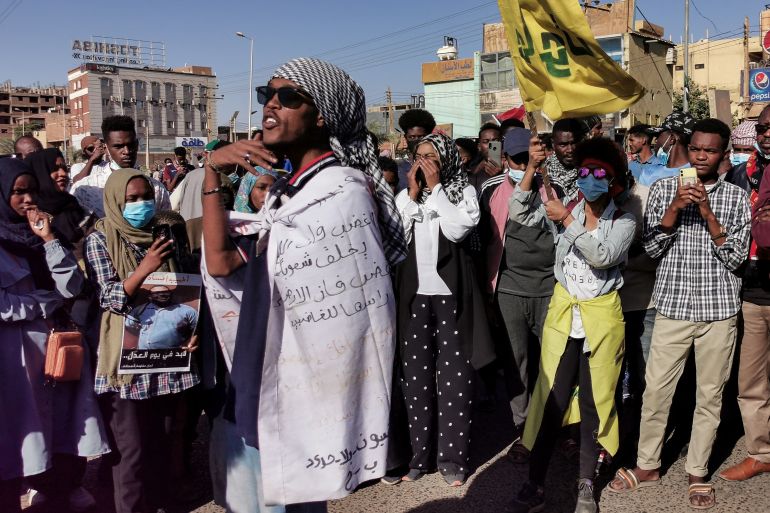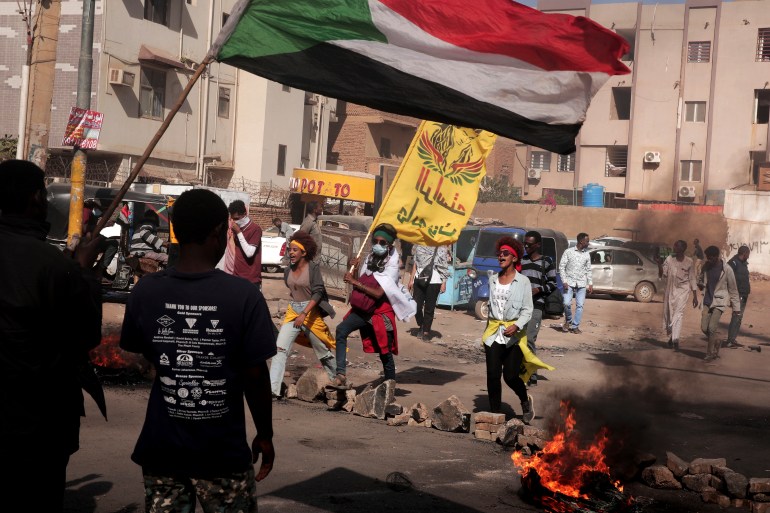Sudanese judges, US denounce crackdown on anti-coup protesters
Thousands resume anti-coup protests in Sudan as US diplomats try to bolster UN efforts to cajole the military in restoring the transition to full civilian rule.

Sudanese judges have condemned violence against anti-coup protesters as the United States said it would consider taking steps against those holding up efforts to resolve Sudan’s political crisis.
At least 72 people have been killed and more than 2,000 wounded as security forces have cracked down on regular protests since the October 25 coup, according to a count by an independent group of medics.
Keep reading
list of 4 itemsSudan security forces fire tear gas at anti-coup protesters
UN starts talks in Sudan over post-coup crisis
2 demonstrators killed at Sudan protest against military rule
Led by General Abdel Fattah al-Burhan, the coup derailed a civilian-military power-sharing deal painstakingly negotiated after the 2019 removal of longtime ruler Omar al-Bashir.
Thousands of protesters took the streets again on Thursday, angered by the killing of at least seven people during a crackdown against protesters on Monday, one of the deadliest days since the coup.
In a tactic used repeatedly, security forces fired tear gas at protesters who rallied in the capital’s twin city of Omdurman, according to witnesses.
The rallies followed calls by Sudan’s main civilian bloc – the Forces for Freedom and Change (FFC) – for demonstrations “in tribute to the martyrs”.
Protesters in Khartoum beat drums and chanted anti-military slogans. Many reiterated calls for the military to leave power completely.
In Wad Madani city to the south, protesters chanted “blood for blood, we will not accept compensations”, according to Adel Ahmed, a witness.
Military leaders have said that the right to peaceful protest is protected and have commissioned investigations into the bloodshed. The violence has deepened the deadlock between pro-democracy groups and the military leadership.
In a statement on Thursday, Sudan’s ruling council affirmed the need for national dialogue, a technocratic cabinet, and adjustments to a transitional constitutional document negotiated after the ousting of former leader Omar al-Bashir in a 2019 uprising.
The document formed the basis for a power-sharing arrangement between the military and civilians that was halted by the coup.
After a failed bid by former Prime Minister Abdalla Hamdok to salvage some civilian control following the coup, the United Nations has been trying to facilitate dialogue between opposing factions.
Frozen support
The coup drew condemnation from Western powers which largely froze badly needed economic assistance to Sudan.
That assistance would only be restarted if violence ended and a civilian-led government was restored, visiting US Assistant Secretary for African Affairs Molly Phee and newly-appointed special envoy David Satterfield said.
Condemning the use of force on protesters, they “made clear the United States will consider measures to hold accountable those responsible for failure to move forward” with a political transition and an end to violence, a US statement said.

The envoys called for independent investigations into deaths and injuries among those protesting against the military.
Meanwhile, in a rare public statement on Thursday 55 Sudanese judges to the judiciary chief said military leaders had “violated agreements and covenants since the October 25 coup, as they have carried out the most heinous violations against defenceless protesters”.
They called for an end to the violence and a criminal investigation.